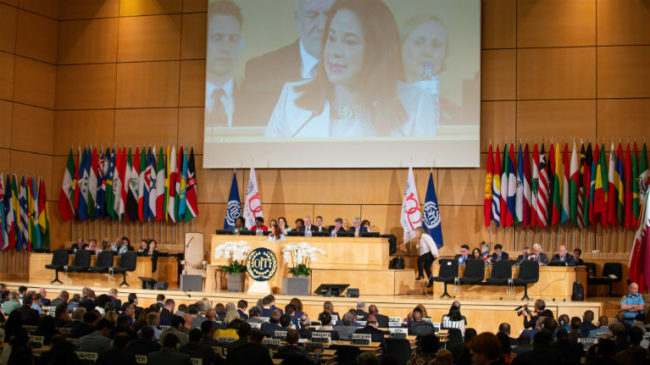The need for skilling and re-skilling the world’s workforce has been advocated at the centenary conference of the International Labour Organisation holding in Geneva, Switzerland.
Some world leaders from the 163 member states of the International Labour Organisation (ILO) also called for immediate action on the future of work.
The leaders made the call when they addressed the Centenary celebration of the 108th International Labour Conference (ILC) on Thursday in Geneva, Switzerland with the theme “Work for a Brighter Future”.
King Letsie III of Lesotho said the future of work can no longer be paid just lip service.
“We cannot talk about the future of work while we still leave the vulnerable members of the labour market behind.
”We are also mindful of the new challenges that the labour market faces with the advent of rapid technological advancement and other dynamics such as robotics and automation.
“We must redouble our efforts in skilling and re-skilling our workforce. Experience has taught us that job creation happens when human ingenuity is paired with knowledge-based innovation.
“Employers and workers alike have to find each other in this era of rapid technological advancement,” he said.
Mr Salvador-Antonio Valdés-Mesa, the First Vice-President of Cuba, said it was imperative that all member states strengthened their commitment to the ILO and its mandate.
“The ILO is turning 100 in a complex context. We observe with concern how ideas and practices which discard multilateralism as a way to solve global problems are spreading, and how they dangerously foster confrontation, aggressive rhetoric, impunity and impositions.”
Also, the President of Colombia, Iván Duque Márquez, told delegates that the fourth industrial revolution posed great challenges for the future of work.
“We firmly believe that the ILO must be the leader of this discussion regarding the challenges and benefits of this fourth industrial revolution.
“Social justice starts with clarity and with ambition, and by being motivated to ensure that the labour market is a pillar of justice in a society,” he added.
Mr António Costa, Prime Minister of Portugal, commended the report by the Global Commission on the Future of Work.
He added that the future will depend on the will of man and the choices we make.
“Technology should serve society; it should help people to work, but also to live better.
“The future of the world is not a race to the bottom, it should be the opposite… We have to take the best social models, we have to be more inclusive, we have to have more dignity for our work and our workers,” he said.
Earlier, the Vice-President of Costa Rica, Mr Marvin Rodríguez Cordero, said to address the new paradigms of the future of work, there was the need to design and develop comprehensive policies centered on human beings and their dignity.
Mr Mia Amor Mottley, Prime Minister of Barbados, said that Government alone, capital alone, or labour alone would not be able to move forward to better the lives of the countries and the development opportunities of the nations.
“The pace of change means that the only certain thing is the principles to which we hold dear.
“The principles that cause us to respect the dignity of work, the decency of work, the principle that burdens us must be shared fairly and bounties must be shared fairly. Those are the only constants,” he added.
The Conference is discussing the challenges presented by the profound transformations that are occurring in the world of work, and could adopt a landmark ILO Centenary Declaration focused on a human-centred approach to the future of work.
The more than 5,700 delegates, representing governments, workers and employers, are also discussing the possible adoption of a new Convention and Recommendation on preventing violence and harassment in the workplace.
Also, some 25 Heads of State and government have already addressed the Conference, which runs from June 10 to June 21, and more are expected to speak on June 20.
NAN






